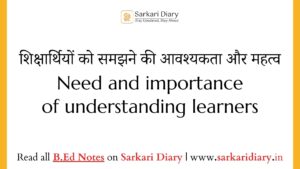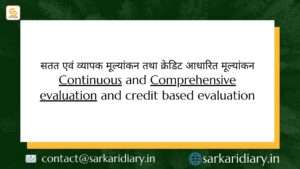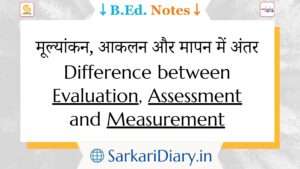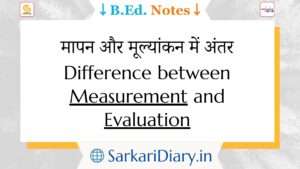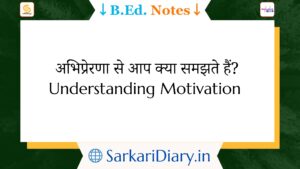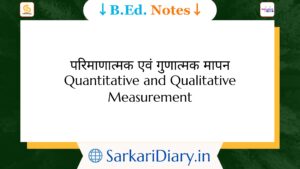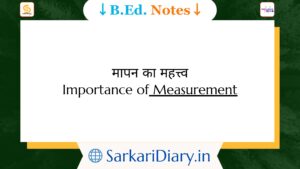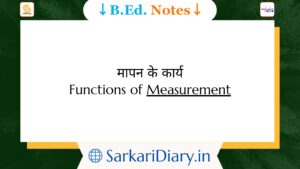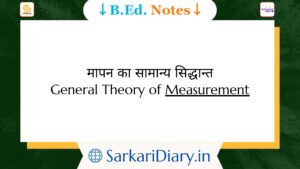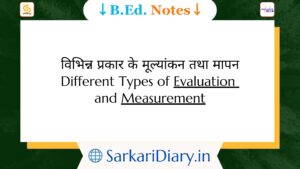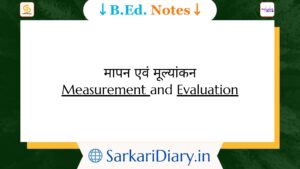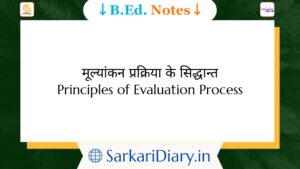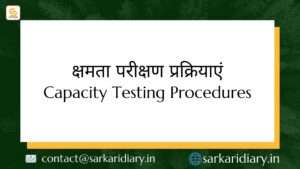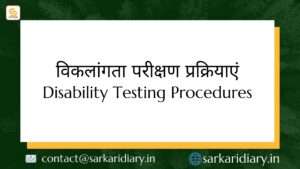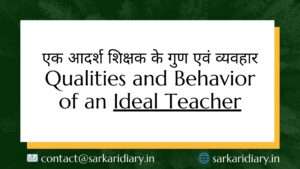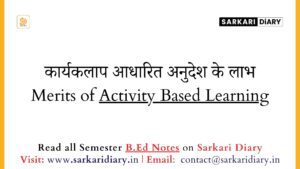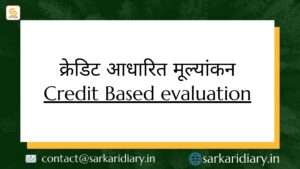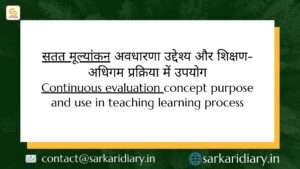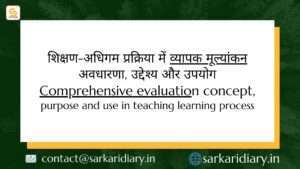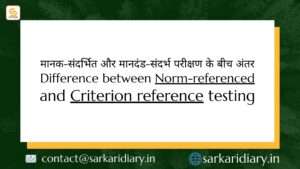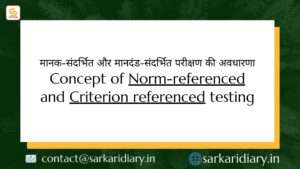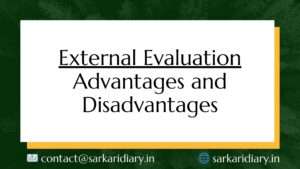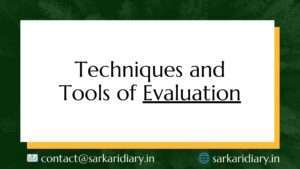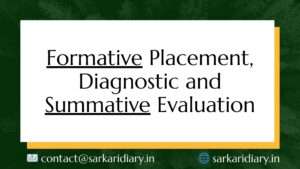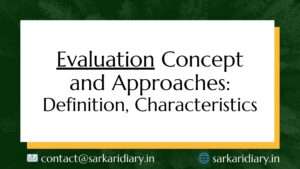Assessment for Learning B.Ed Study Material
B.Ed Study Notes by Sarkari Diary
Welcome to Sarkari Diary, your favorite website for B.Ed Notes on Assessment for Learning.
In this section, we provide comprehensive notes and resources to help B.Ed students understand the concept of assessment for learning.
Sarkari Diary website provides comprehensive notes on assessment for learning, covering all the important topics covered in the B.Ed syllabus.
These notes are easy to understand and well-organized, making them ideal for students who are new to the subject or need quick revision.
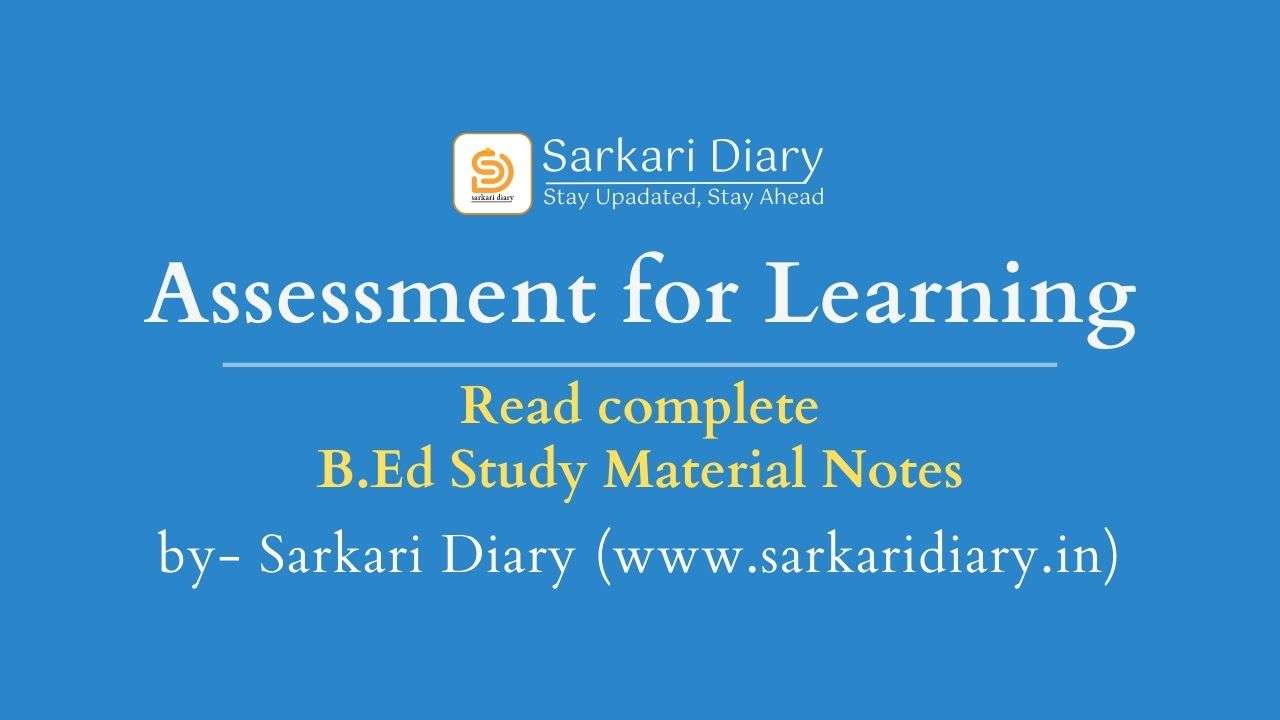
- तर्क से आप क्या समझते हैं? B.Ed Notes
- शिक्षार्थियों को समझने की आवश्यकता और महत्व B.Ed Notes
- मूल्यांकन: सतत एवं व्यापक मापन की महत्वपूर्णता B.Ed Notes
- सतत एवं व्यापक मूल्यांकन | Continuous and Comprehensive Evaluation B.Ed Notes
- मापन एवं मूल्यांकन B.Ed Notes
- मूल्यांकन प्रक्रिया के चरण B.Ed Notes
- आलोचनात्मक समीक्षा एवं सोच B.Ed Notes
- मूल्यांकन, आकलन और मापन में अंतर | Difference between evaluation, assessment and measurement B.Ed Notes
- मापन और मूल्यांकन में अंतर | Difference between measurement and evaluation B.Ed Notes
- मूल्यांकन, आकलन और माप की अवधारणा | Concept of evaluation, assessment and measurement B.Ed Notes
- मूल्यांकन, आकलन और माप: समानताएं और अंतर B.Ed Notes
- अभिप्रेरणा से आप क्या समझते हैं? | Motivation B.Ed Notes in Hindi
- परिमाणात्मक एवं गुणात्मक मापन | Quantitative and Qualitative Measurement B.Ed Notes
- मापन का महत्त्व | Importance of Measurement B.Ed Notes
- मापन के कार्य | Functions of Measurement B.Ed Notes
- मापन का सामान्य सिद्धान्त | General Theory of Measurement B.Ed Notes
- विभिन्न प्रकार के मूल्यांकन तथा मापन | Different Types of Evaluation and Measurement B.Ed Notes
- मापन एवं मूल्यांकन | Measurement and Evaluation B.Ed Notes
- मूल्यांकन प्रक्रिया के चरण | Steps in the evaluation process B.Ed Notes
- मूल्यांकन प्रक्रिया के सिद्धान्त | Principles of Evaluation Process B.Ed Notes
- क्षमता परीक्षण प्रक्रियाएं B.Ed Notes
- विकलांगता परीक्षण प्रक्रियाएं B.Ed Notes
- Qualities and Behavior of an Ideal Teacher B.Ed Notes
- कार्यकलाप आधारित अनुदेश के लाभ [Merits of Activity Based Learning]
- Piaget’s Theory of Cognitive Development B.Ed Notes
- Credit-Based Evaluation B.Ed Notes
- Continuous Evaluation: Concept, Purpose, and Use in the Teaching-Learning Process B.Ed Notes
- Continuous and Comprehensive Evaluation and Credit Based Evaluation B.Ed Notes
- Evaluation: Concept, Purpose and Use in the Teaching-Learning Process B.Ed Notes
- Difference between Norm-referenced and Criterion reference Testing B.Ed Notes
- Concept of Norm-referenced and Criterion referenced testing B.Ed Notes B.Ed Notes
- External and Internal Evaluation: Advantages and Disadvantages B.Ed Notes
- Techniques and Tools of Evaluation B.Ed Notes
- Formative Placement, Diagnostic and Summative Evaluation B.Ed Notes
- Evaluation Concept and Approaches: Definition, Characteristics and Need (B.Ed) Notes
The course will enable student-teachers to
- gain a critical understanding of issues in assessment and evaluation (from a constructivist paradigm);
- become cognisant of key concepts, such as formative and summative assessment, evaluation and measurement, test, examination;
- be exposed to different kinds and forms of assessment that aid student learning;
- become the use of a wide range of assessment tools, and learn to select and construct these appropriately; and
- evolve realistic, comprehensive and dynamic assessment procedures that are able to keep the whole student in view;
Assessment for Learning B.Ed Notes
Welcome to Sarkari Diary, your go-to website for B.Ed notes on Assessment for Learning. In this section, we provide comprehensive notes and resources to help B.Ed students understand the concept of assessment for learning.
What is Assessment for Learning?
Assessment for Learning is an approach to assessment that focuses on using assessment as a tool for learning and improvement. It is a formative assessment method that involves ongoing feedback and dialogue between teachers and students to enhance learning outcomes.
Assessment for Learning promotes the idea that assessment should not be seen as a mere evaluation of students’ performance, but rather as a means to identify strengths and weaknesses, provide targeted feedback, and guide students towards their learning goals.
Key Principles of Assessment for Learning
There are several key principles that underpin Assessment for Learning:
- Clear learning goals and success criteria
- Continuous and ongoing assessment
- Effective feedback and self-assessment
- Collaborative learning and peer assessment
- Using assessment data to inform instruction
Benefits of Assessment for Learning
Assessment for Learning offers various benefits to both teachers and students:
- Enhanced student engagement and motivation
- Increased self-awareness and metacognitive skills
- Improved teaching and instructional strategies
- Targeted interventions and support for struggling students
- Effective communication and partnership with parents
At Sarkari Diary, we provide detailed B.Ed notes, examples, and case studies to help you understand the principles and practices of Assessment for Learning. Explore our resources and elevate your knowledge and skills in this important area of education.

